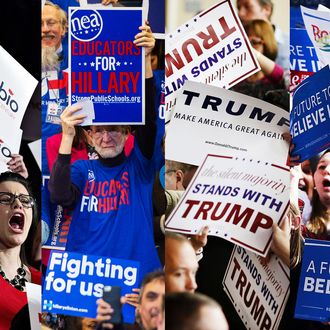
Political junkies exhausted by Super Tuesday may be tempted to ignore this weekend’s scattered nominating contests and catch up on their rest. As of this writing, even the normally sleepless eye of Politico has yet to focus on the Louisiana primary, the Maine caucuses, the Nebraska Democratic caucuses, the Kentucky Republican caucuses, and the Puerto Rico Republican primary. All but the Maine Democratic and Puerto Rico Republican events will be held Saturday, with those two wrapping the weekend up on Sunday.
Speculation about Sub-Super Saturday and Sorta-Significant Sunday is limited in part by sparse polling; the only recent public polls for any of these contests have been taken in Louisiana. As a result, expectations are somewhat muted.
In Puerto Rico, Spanish-speaking Marco Rubio is expected to win, with perhaps a bonus impact on the crucial March 15 primary in Florida, where just enough of Central Florida’s large Puerto Rican population could vote Republican to make a difference in a close race. Polls in Louisiana and prediction markets for Kentucky and Maine (where Trump seems to have a regional advantage along with an endorsement from wild-man Governor Paul LePage) have Donald Trump strongly favored. The betters like Ted Cruz for Christian-right-dominated Kansas. All these contests are closed to independents and Democrats, which could be a factor in limiting Trump’s vote, and all use some variation on proportional representation, which limits the likelihood of blowout winners. The wildcard, of course, is whether the Detroit candidate debate, generally rated as a debacle for Trump, actually affected his following. You’d better believe an upset loss anywhere would be interpreted that way.
On the Democratic side, FiveThirtyEight gives Hillary Clinton the same 99 percent plus chance of winning Louisiana as it gave her in South Carolina, which isn’t surprising because it has a similar African-American majority in its primary electorate and Clinton’s carrying that demographic by a similar 5-1 margin in recent polls. In much-whiter Kansas and Nebraska, Sanders is favored, though not overwhelmingly; even though these are technically closed caucuses, they are like Iowa in that independents and Republicans can change their affiliation at the caucus site. Maine is assumed to be big-time Bernie Country. He could use some bragging rights about now, though any loss in the caucus states will be cited as a sign of waning strength.
Anyone wanting to follow returns from all these events is going to have to be patient. Probably the first returns to come in on Saturday will be from Kansas Republicans, who end their caucuses at 2 p.m. CST. Kansas Democrats begin caucusing at 3:30 p.m. CST. Kentucky Republicans (expecting a low turnout in an unusual caucus arranged strictly for the convenience of former presidential candidate Senator Rand Paul) will end their voting at 4 p.m. local time (EST and CST). Nebraska Democrats and Maine Republicans will caucus at locally determined times ranging from mid-morning to early evening. In Louisiana polls will close at 8 CST. On Sunday Maine Democrats will spread their local caucuses around from 1 to 9 p.m. EST, and in Puerto Rico polls will close at 3 p.m. EST. Then we all have to wait two more days until four more Republican events and two more Democratic primaries are held.






























